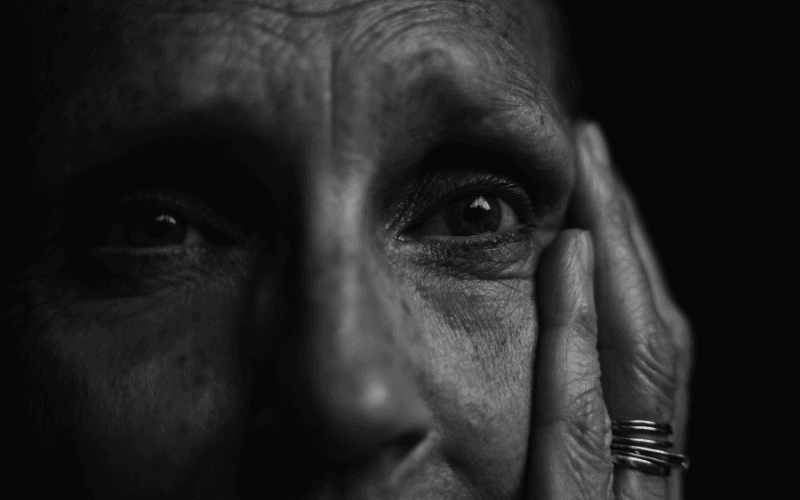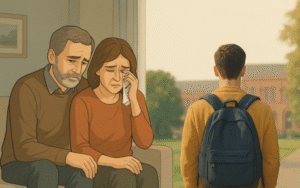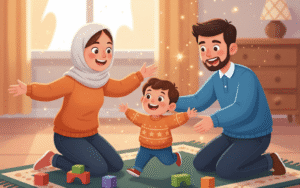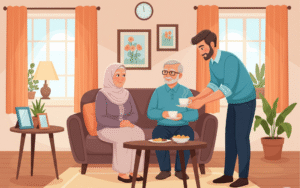Old Age Homes: The Heartbreak, Neglect, and Islam’s Solution

The term “old age home” is a simple combination of “elderly” and “shelter.” In a literal sense, it’s a residence for the aged. But in today’s social context, that term paints a picture of deep sorrow and quiet despair. The very people whose youthful energy and hard work built a family and contributed to society now face a lonely, helpless existence in their twilight years.
Professionals who were once intellectuals, teachers, or respected officials now find themselves neglected and abandoned by their own children, becoming “orphans with living children.” This article delves into this heartbreaking reality and explores the permanent solution offered by Islam.
Chapter 1: The Heartbreaking Reality of Life in an Old Age Home
Just a few decades ago, the concept of an old age home was foreign to many societies. Today, their numbers are growing at an alarming rate. Statistics from various regions confirm this worrying trend. Whether in a bustling capital or a quiet town, the walls of these institutions echo with the same muffled cries of anguish.
But it begs the question: Why do these homes exist? Why isn’t a person’s own family their final sanctuary? The answers reveal some of our society’s most painful truths.
Behind the Exile: A Glimpse into the Causes
- The Empty Nest: Many children move abroad for higher education or careers and never return. Left alone, their aging parents face profound loneliness and insecurity, eventually feeling forced to seek refuge in an old age home.
- Being Seen as a Burden: Some children view their elderly parents as a “burden” on the family. They consider the time and money spent on their care to be a waste, leading to neglect that silently pushes their parents away.
- Family Conflict: In many households, friction between a daughter-in-law and her in-laws creates an unbearable environment. Pressured by his wife, a son may feel he has no choice but to place his parents in a care facility. The story of 77-year-old Arun Bhattacharya, who had to take shelter in an old age home after being physically abused by his son’s wife, is just one of many such tragedies.
- Greed for Property: There are countless unfortunate parents like Dr. Abdul Awwal, a retired professor from Jahangirnagar University. His children deceitfully transferred his hard-earned assets into their names, leaving him destitute. Despite his children owing him a significant amount of money, this professor now lives in a senior home.
- Negligence from the Well-Established: Perhaps the most tragic irony is that highly educated and socially successful individuals are often the most neglectful of their parents. In their sprawling city apartments, there is room for expensive furniture and modern luxuries, but not an inch of space for the mother and father who gave them life.
Each of these stories is proof that the rise of old age homes is not a natural progression but a tragic monument to our society’s moral and ethical decline.
Chapter 2: Letters of Anguish: Heartbreaking Cries from an Old Age Home
It’s impossible to truly capture the agony of those confined within the four walls of an old age home. Their deepest feelings often surface in unsent letters addressed to the children they miss so dearly.
1. From a Father’s Pen: “My Son, How Are You?”
“…It’s been five years since you left me in this old age home. You haven’t come to visit even once. When your mother passed away, I never remarried, fearing it would cause you pain. I remember how many days I went hungry just to pay for your education. Today, there’s room in your house for a pricey dog, but no room for your old father. …I only wanted to live in your home. I would have been content eating the scraps from your and your wife’s plates. …Still, I pray you live happily. When you turn 65, your spot will be right here in this room. Then, the two of us can be neighbors.”
2. From a Mother’s Heart: “Sending You My Love”
“…When you were little, you couldn’t bear to be without me. Do you remember when you fell from the mango tree and hurt your knee? Your father sold our farming ox to pay for your treatment. I sat by your side for three days and three nights without eating or sleeping. …Don’t you ever think of me? I have one last wish. When I die, please bury me next to your father’s grave. You won’t have to spend any money. The gold nose-pin your father gave me for our wedding is tied in the corner of my sari. Sell that to buy my shroud.”
3. A Mother’s Unspoken Pain: “A Mother’s Blessing is Always With You”
“…When the people here ask me, ‘Your son is such a high-ranking officer, why are you in an old age home?’ you know what I do, my son? I keep your reputation safe. Smiling broadly, I tell them, ‘I came here to spend my old age peacefully in the remembrance of God.’ Standing near the phone, I pretend to talk to you, acting out a loud conversation, asking, ‘My son! Why do you worry about me so much? I’m doing just fine.’ …Believe me, son, I never had another child because I didn’t want anyone else to share the love I had for you. I am not upset with you. I have been given the right to live until my last breath with the identity of being your mother. How many people are that fortunate?”
These letters aren’t just ink on paper; they are the cries of bleeding hearts that should shake our collective conscience.
Chapter 3: Islam on Elderly Care: The Sacred Rights and Dignity of Parents
Islam places the family unit at the core of society and elevates the rights of parents to a station second only to the worship of God. The entire concept of casting parents aside in an old age home stands in stark opposition to these foundational teachings.
The Unmistakable Command of the Quran
Allah (SWT) says:
وقَضىٰ رَبُّكَ أَلّا تَعبُدوا إِلّا إِيّاهُ وَبِالوالِدَينِ إِحسانًا ۚ إِمّا يَبلُغَنَّ عِندَكَ الكِبَرَ أَحَدُهُما أَو كِلاهُما فَلا تَقُل لَهُما أُفٍّ وَلا تَنهَرهُما وَقُل لَهُما قَولًا كَريمًا ﴿٢٣﴾ وَاخفِض لَهُما جَناحَ الذُّلِّ مِنَ الرَّحمَةِ وَقُل رَبِّ ارحَمهُما كَما رَبَّياني صَغيرًا
“And your Lord has decreed that you not worship except Him, and to parents, good treatment. Whether one or both of them reach old age [while] with you, say not to them [so much as], ‘uff,’ and do not repel them but speak to them a noble word. And lower to them the wing of humility out of mercy and say, ‘My Lord, have mercy upon them as they brought me up [when I was] small.'”
(Surah Bani-israil, 17:23-24)
This verse forbids even the slightest expression of annoyance, commanding us to treat our parents with the utmost respect and service.
The Teachings of Prophet Muhammad (ﷺ)
- The Best of Deeds: A companion asked the Prophet (ﷺ), “Which deed is the dearest to Allah?” He replied, “To offer the prayers at their stated fixed times.” He asked, “What is the next?” He replied, “To be good and dutiful to your parents.” (Sahih al-Bukhari 527)
- The Path to Paradise: The Prophet (ﷺ) said, “May he be disgraced! May he be disgraced! May he be disgraced!” It was said, “Who, O Messenger of Allah?” He said, “The person whose parents, one or both of them, reach old age in his life, and he does not enter Paradise (by serving them).” (Sahih Muslim 2551)
- The Status of the Mother: A man came to the Prophet (ﷺ) and said, “O Messenger of God! Who among the people is the most worthy of my good companionship?” The Prophet said: “Your mother.” The man said, “Then who?” The Prophet said: “Then your mother.” The man further asked, “Then who?” The Prophet said: “Then your mother.” The man asked again, “Then who?” The Prophet said: “Then your father.” (Sahih al-Bukhari 5971)
- Ownership of Wealth: The Prophet (ﷺ) explicitly stated to a man, “You and your wealth belong to your father.” (Sunan Ibn Majah 2291). Therefore, providing for one’s parents is not a favor; it is a compulsory duty.
In Islam, serving aging parents is one of the easiest paths to Heaven, while neglecting them is a direct path to Hell.
Chapter 4: Finding a Solution: The Role of Society, Law, and Compassion
Overcoming this social decay requires a collective effort from all of us.
1. Legal Protection and Enforcement
Many countries are now enacting laws to protect the rights of parents. These laws typically make it mandatory for children to provide financial support for their parents, with penalties like fines or imprisonment for those who fail to comply. Some laws even mandate that a portion of a child’s income be given to their parents. Proper enforcement and public awareness of these laws can play a crucial role in making children more responsible.
2. Education and Awareness
From a young age, children must be taught the importance of family bonds and respect for elders, both at home and in schools. The media should regularly broadcast content highlighting the plight of the elderly and reinforcing the rights of parents.
3. The Role and Environment of Old Age Homes
It is also true that, in some situations, old age homes are a bitter necessity. For those who have no children or have been completely abandoned, a safe haven is essential. However, these facilities must be centers of genuine care, not prisons.
- A Service-Oriented Mission: These homes should operate with a 100% service-oriented mindset, not for commercial profit. The staff must be compassionate and caring.
- A Spiritual Environment: In the final stages of life, people seek spiritual peace. Old age homes should provide an environment conducive to worship and religious learning, allowing residents to prepare for their departure from this world with faith and serenity.
Those who establish and serve in such homes for the helpless are undoubtedly worthy of praise and will be greatly rewarded by God.
Why Your Home is the Best Place for Aging Parents
In their old age, parents become like children again. Just as they endured countless hardships to raise us, it is our duty to stand by them in their final years. We must remember that we, too, will be old one day. If we send our parents to an old age home today, our children may learn to follow the same path.
There is no friend in this world as selfless as a parent. Their love and affection for their children are pure and unconditional. Caring for them is not a favor we bestow upon them; it is a fundamental duty—a ‘Haqqul Ibad’ (a right of God’s servant)—for which we will be held accountable in the court of Allah.
No matter how educated or “modern” a person becomes, if they lack respect for their parents, they are deprived of the very quality that makes them human.
Let’s not forget our roots. Let’s ensure that every child’s house—not an old age home—becomes the ultimate and most loving sanctuary for their parents. May Allah grant us all the ability to do so. Ameen.
Frequently Asked Questions
What is one of the main causes for the rise of old age homes?
A significant cause is the "Empty Nest" phenomenon, where children move abroad for careers or education and never return, leaving their aging parents to face profound loneliness and insecurity.
What does the Quran say about a child's conduct toward aging parents?
The Quran explicitly commands children not to say to their parents 'uff' (the slightest expression of annoyance) and to treat them with 'good treatment' and 'a noble word' when they reach old age.
Why is a child's home considered the best sanctuary for aging parents?
In their old age, parents become like children again, and caring for them is a fundamental duty (a 'Haqqul Ibad'). The article suggests that if children send their parents away, their own children may follow the same path.




